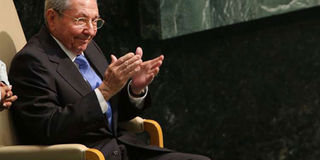The gods have gone crazy: Nervous moments as the world meets at UN

Cuba President Raul Castro sits after speaking at the United Nations General Assembly at U.N. headquarters on September 28, 2015 in New York City. This time, though, it was the first time a Cuban leader was in the US after the normalisation of relations following over 50 years of diplomatic enmity between the two countries. PHOTO | SPENCER PLATT | AFP
What you need to know:
- he first non-European pope, Argentinian Pope Francis, addressed the UN during a visit to the US where he was treated like a rock star. He is an interesting pope this one, and even atheists love him.
- There is a thawing of relations between, at least, the West and Iran, after over 30 years of hostility, following the nuclear deal it signed with the world powers.
- Information truly is power. The thing though is that these days, most people have it, and the world has become ungovernable. Yet, there is still something promising about all the chaos.
Sometimes when you are at a distance, you do not read things properly. So I am wondering whether it is just I, or if indeed there is something different about this year’s United Nations General Assembly (Unga).
First, it is full house. And most leaders, except Zimbabwe’s Robert Mugabe, are carrying themselves with a sense of solemn burden.
There is a sense that the world is on the verge of making significant breakthroughs.
For example, figures show that the number of children around the world who die before their fifth birthday have dropped by 50 per cent since 1990, and the share of people living in poverty decreased dramatically over the past decade.
Although most of the world population is still considered “low income”, the share for the “poor” halved between 2001 and 2011, and the middle class also grew, reports show.
AN INTERESTING POPE
The first non-European pope, Argentinian Pope Francis, addressed the UN during a visit to the US where he was treated like a rock star. He is an interesting pope this one, and even atheists love him.
Also, Cuban President Raul Castro spoke to the UN General Assembly, like his more charismatic but long-winded brother, Fidel Castro, had in the past.
This time, though, it was the first time a Cuban leader was in the US after the normalisation of relations following over 50 years of diplomatic enmity between the two countries.
Like his predecessors, Iranian President Hassan Rouhani too was at the UN. But, again, this time was different. There is a thawing of relations between, at least, the West and Iran, after over 30 years of hostility, following the nuclear deal it signed with the world powers.
Yet, despite all that, the world feels like it is falling apart. First, China, whose economy was growing as if growth was going out of fashion, and that Africa was banking on to drag it along into great wealth, developed feet of clay.
TODAY'S WARS
Many African countries whose economic growth model was fashioned on China’s growth, are crumbling like sand castles.
Secondly, and partly related to that, the prices of commodities such as oil, which was popping up everywhere on the continent, have collapsed.
Then there are millions of refugees/immigrants on the move in scenes the world has not seen in 70 years. Most of them are displaced by repression and wars in Afghanistan, Iraq, Syria, Yemen, Burma, Libya, Eritrea, Somalia, and thousands from West Africa, the Horn of Africa, and the Maghreb, who are looking for green pastures, have joined them.
We have new types of “non-state actors”. In most of the wars of recent years, foreign powers like the US or Russia have invaded a nation to impose their will upon it and install a friendly regime.
Or domestic rebels have taken up arms to overthrow the local dictator and his regime and take power.
But now we have groups such as the Islamic State that seek to tear apart the way the world has been organised for the past 100 years and take us back to the 19th century, to religious empires, caliphates.
But perhaps what is more troubling about today’s wars is that they do not seem to end once they start, as we have seen closer home in Somalia.
AN UNGOVERNABLE WORLD
It has become nearly impossible to defeat an enemy comprehensively, get them to hand in their weapons, give up the fight, and go back to their gardens to be farmers again.
Some kind of war has become the new normal in several countries. The one thing that has made all this possible is the internet and, by extension, the mobile phone. Thus ordinary people have knowledge that only a few in the world had before.
A clever peasant with a mobile phone, access to the internet, and who can pick up some wires and discarded batteries in the neighbourhood can make a bomb.
If you live in a rural town, in the past if you wanted to seek the good life, you migrated to Nairobi or Dar es Salaam, found a room in the slums, and took your chances.
Today you can link up with a smuggler network online that will deliver you to Sicily or Greece and you can try your luck from there.
Information truly is power. The thing though is that these days, most people have it, and the world has become ungovernable. Yet, there is still something promising about all the chaos.





